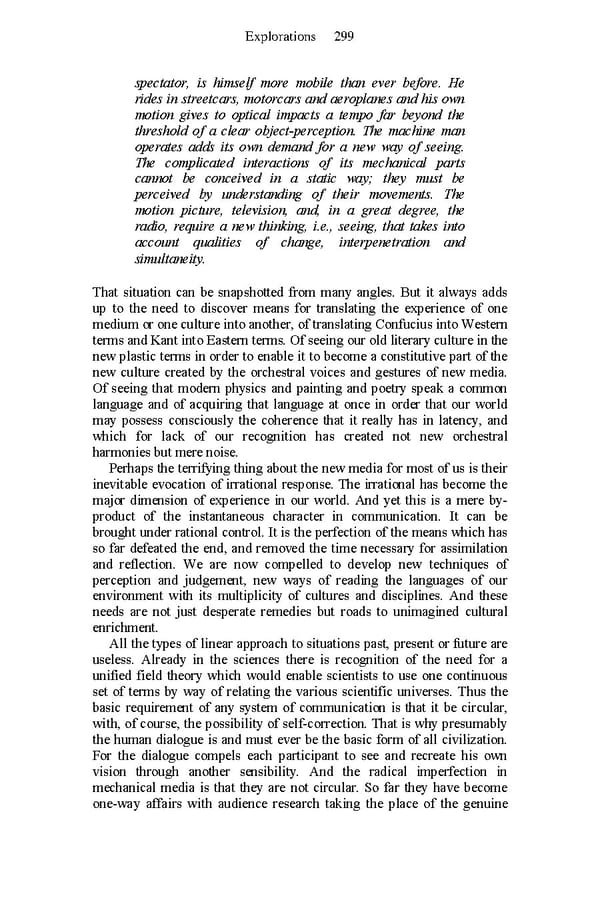Explorations 299 spectator, is himself more mobile than ever before. He rides in streetcars, motorcars and aeroplanes and his own motion gives to optical impacts a tempo far beyond the threshold of a clear object-perception. The machine man operates adds its own demand for a new way of seeing. The complicated interactions of its mechanical parts cannot be conceived in a static way; they must be perceived by understanding of their movements. The motion picture, television, and, in a great degree, the radio, require a new thinking, i.e., seeing, that takes into account qualities of change, interpenetration and simultaneity. That situation can be snapshotted from many angles. But it always adds up to the need to discover means for translating the experience of one medium or one culture into another, of translating Confucius into Western terms and Kant into Eastern terms. Of seeing our old literary culture in the new plastic terms in order to enable it to become a constitutive part of the new culture created by the orchestral voices and gestures of new media. Of seeing that modern physics and painting and poetry speak a common language and of acquiring that language at once in order that our world may possess consciously the coherence that it really has in latency, and which for lack of our recognition has created not new orchestral harmonies but mere noise. Perhaps the terrifying thing about the new media for most of us is their inevitable evocation of irrational response. The irrational has become the major dimension of experience in our world. And yet this is a mere by- product of the instantaneous character in communication. It can be brought under rational control. It is the perfection of the means which has so far defeated the end, and removed the time necessary for assimilation and reflection. We are now compelled to develop new techniques of perception and judgement, new ways of reading the languages of our environment with its multiplicity of cultures and disciplines. And these needs are not just desperate remedies but roads to unimagined cultural enrichment. All the types of linear approach to situations past, present or future are useless. Already in the sciences there is recognition of the need for a unified field theory which would enable scientists to use one continuous set of terms by way of relating the various scientific universes. Thus the basic requirement of any system of communication is that it be circular, with, of course, the possibility of self-correction. That is why presumably the human dialogue is and must ever be the basic form of all civilization. For the dialogue compels each participant to see and recreate his own vision through another sensibility. And the radical imperfection in mechanical media is that they are not circular. So far they have become one-way affairs with audience research taking the place of the genuine
 Essential McLuhan Page 305 Page 307
Essential McLuhan Page 305 Page 307